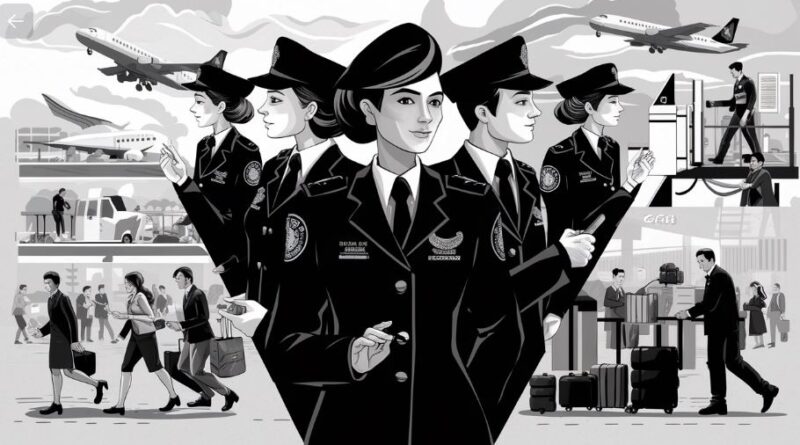Ground Handling Services Providers
Introduction
Ground Handling Services Providers are fundamental to the safety and security of airline operations. These services encompass a wide range of activities, from aircraft marshalling and baggage handling to catering and passenger assistance. While often operating behind the scenes, ground handling teams play a critical role in ensuring that every flight is conducted safely and securely. This article explores how ground handling services contribute to airline safety and security, examining the specific tasks involved, the importance of training and regulations, and the challenges faced in this high-stakes environment.
Critical Safety-Related Ground Handling Services
- Aircraft Marshalling and Parking: One of the most visible aspects of ground handling is aircraft marshalling, where ground crew guide aircraft to their designated parking positions. Precise marshalling is essential to avoid collisions with other aircraft, vehicles, or airport infrastructure. Proper positioning also ensures that aircraft are safely secured for refueling, boarding, and loading operations.
- Aircraft Towing and Pushback: Ground handling teams are responsible for towing aircraft between locations at the airport and for performing pushback operations prior to departure. These tasks require careful coordination and adherence to safety protocols to prevent accidents. The use of tugs and tractors, along with clear communication between ground crew and flight deck, is critical to the safe movement of aircraft on the ground.
- Baggage and Cargo Handling: The correct handling of baggage and cargo is crucial for flight safety. Ground handling teams must ensure that all items are properly loaded, balanced, and secured in the aircraft’s cargo hold. Improper loading can lead to weight and balance issues, which can affect the aircraft’s performance during takeoff, flight, and landing. Additionally, ground crews must follow strict protocols for handling hazardous materials and ensure that no prohibited items are loaded onto the aircraft.
- Aircraft Refueling: Safe refueling of aircraft is another critical task performed by ground handling services. This involves connecting refueling equipment to the aircraft, monitoring fuel levels, and ensuring that no fuel leaks or spills occur. Ground handling teams must also coordinate with the flight crew to ensure that the correct amount and type of fuel are delivered, as errors in this process can have serious safety implications.
- De-icing and Anti-icing Operations: In cold weather conditions, ground handling teams are responsible for de-icing and anti-icing aircraft to ensure that ice does not accumulate on critical surfaces such as wings and control surfaces. This process is vital to maintaining the aircraft’s aerodynamic properties and ensuring safe takeoff and flight. De-icing operations require specialized equipment and trained personnel to perform the task effectively and safely.
Security-Related
- Passenger Screening and Security Checks: While security screening is primarily managed by airport authorities, ground handling teams often assist with the process, particularly in handling passengers with special needs or managing queues. Effective coordination and communication between ground handlers and security personnel are essential to maintaining a secure environment while ensuring that the passenger experience is smooth and efficient.
- Baggage Screening: Ground handling teams play a role in the screening of checked baggage to ensure that no prohibited items are loaded onto the aircraft. This involves the use of advanced screening technologies such as X-ray machines, explosive detection systems, and sometimes manual inspections. Ground handling personnel must be vigilant and trained to recognize potential threats while maintaining the flow of operations.
- Aircraft Security Checks: Before an aircraft is cleared for boarding, ground handling teams perform security checks to ensure that no unauthorized items or individuals have gained access to the aircraft. These checks involve inspecting the cabin, cargo hold, and external areas of the aircraft. Ground handling staff must adhere to strict protocols and report any suspicious findings to security authorities immediately.
- Access Control and Security of Ground Service Equipment: Ground handling companies are responsible for ensuring that only authorized personnel have access to aircraft and sensitive areas of the airport. This includes securing ground service equipment (GSE) such as fuel trucks, baggage carts, and tugs, which could potentially be used in a security breach. Access control measures, such as ID checks and biometric systems, are used to prevent unauthorized access.
The Importance of Training and Compliance
The safety and security tasks performed by ground handling services require a high level of training and strict adherence to regulations.
- Training Programs: Ground handling personnel undergo extensive training in safety procedures, equipment operation, and emergency response. Regular refresher courses and drills are essential to keep staff up-to-date with the latest safety standards and best practices. Training also covers the proper use of personal protective equipment (PPE) and the handling of hazardous materials.
- Compliance with Regulations: Ground handling companies must comply with a complex web of regulations set by aviation authorities such as the International Air Transport Association (IATA), the International Civil Aviation Organization (ICAO), and national regulatory bodies. These regulations cover everything from the maintenance of ground service equipment to the procedures for handling dangerous goods. Non-compliance can result in severe penalties, including fines and the suspension of operating licenses.
- Safety Management Systems (SMS): Many ground handling companies have implemented Safety Management Systems (SMS) to systematically identify, assess, and mitigate risks. An SMS provides a structured framework for managing safety, ensuring that potential hazards are identified and addressed before they lead to incidents. This proactive approach is critical in an industry where the margin for error is minimal.
Challenges in Ground Handling Safety and Security
Despite the rigorous training and strict regulations, ground handling services face several challenges in maintaining high safety and security standards.
- Operational Pressures: Ground handling operations are often subject to intense time pressures, particularly during peak travel periods. The need to turn around aircraft quickly can sometimes lead to shortcuts or lapses in safety procedures. Ground handling companies must balance efficiency with safety, ensuring that time pressures do not compromise the quality of service.
- Human Error: While technology and automation have reduced the likelihood of errors in many areas of ground handling, human error remains a significant risk factor. Mistakes in tasks such as loading baggage, operating ground service equipment, or performing security checks can have serious consequences. Continuous training, supervision, and the use of checklists are essential to minimizing the risk of human error.
- Technological Reliance and Cybersecurity: As ground handling services become increasingly reliant on technology, they also become more vulnerable to cyber threats. A cyberattack on an airport’s ground handling systems could disrupt operations, compromise safety, and lead to significant financial losses. Ground handling companies must invest in robust cybersecurity measures to protect their systems and data.
- Coordination with Multiple Stakeholders: Ground handling services must coordinate with multiple stakeholders, including airlines, airport authorities, security agencies, and other ground handling providers. Miscommunication or lack of coordination between these parties can lead to safety and security breaches. Effective communication and collaboration are essential to ensuring that all parties work together seamlessly.
Conclusion
Ground handling services are integral to the safety and security of airline operations. From managing aircraft on the ground to ensuring that baggage and cargo are properly handled, ground handling teams perform a wide range of tasks that directly impact flight safety. Their role in security, from screening passengers and baggage to securing access to aircraft, is equally crucial. The challenges they face, including operational pressures, human error, and cybersecurity threats, highlight the need for continuous training, strict compliance with regulations, and effective coordination with other stakeholders. As the aviation industry evolves, the role of ground handling services in maintaining safety and security will remain as important as ever.
Located : United Kindgom, United Arab Emirates




